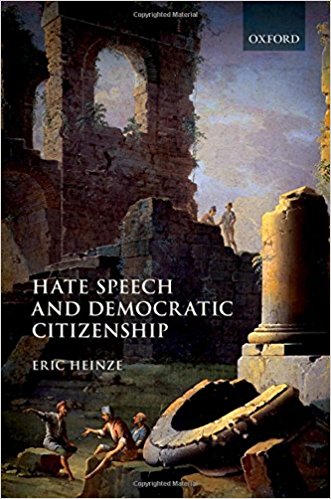In Hate Speech and Democratic Citizenship, Eric Heinze argues for the unrestricted right to freedom of speech in contemporary democratic states, positioning it as one of the ‘legitimising expressive conditions’ of democratic citizenship. While some readers may take issue with Heinze’s particular conceptualisation of democracy and his account of the potential risks of hate speech, this is an important and accessible discussion of freedom of expression that gives credence to the real-world factors that shape legal regimes, writes Andrew Reid.
Hate Speech and Democratic Citizenship. Eric Heinze. Oxford University Press. 2016.
 Debates about the regulation of speech are never far from the opinion pages, although even passionate defences of freedom of expression often go little further than platitudes and aphorisms. In this book, Hate Speech and Democratic Citizenship, legal philosopher Eric Heinze sets out a systematic case for an unimpeded right to freedom of expression in contemporary democratic states. In particular, he provides a sustained critique of ‘viewpoint-selective’ bans on acts of expression often referred to as ‘hate speech’. He argues that we ought to think of freedom of expression not as an exhaustive natural right, but as something ‘constitutive’ of democratic citizenship.
Debates about the regulation of speech are never far from the opinion pages, although even passionate defences of freedom of expression often go little further than platitudes and aphorisms. In this book, Hate Speech and Democratic Citizenship, legal philosopher Eric Heinze sets out a systematic case for an unimpeded right to freedom of expression in contemporary democratic states. In particular, he provides a sustained critique of ‘viewpoint-selective’ bans on acts of expression often referred to as ‘hate speech’. He argues that we ought to think of freedom of expression not as an exhaustive natural right, but as something ‘constitutive’ of democratic citizenship.
Freedom of expression is, for Heinze, one of the ‘legitimising expressive conditions’ of democracy (95). Any restriction on acts of expression undermines the democratic credentials of the state and damages (but does not completely undermine) its legitimacy (86-87). It is important that Heinze claims that bans on freedom of expression are logically inconsistent with democratic procedures, and not just that they are typically inimical to them. He targets a range of positions that defend bans on some acts of expression in the name of protecting democratic institutions. Whilst there may be good reason to limit acts of expression in some circumstances – for example, for reasons of security – viewpoint-selective bans can never ‘render society more democratic’ (49). Although Heinze spends part of the fourth chapter setting out his own view of democratic citizenship, the central connection that he establishes between free expression and citizenship will resonate with many political theorists in the liberal tradition and beyond.
If the more detailed account of citizenship is not essential to the central claims made in the book, it is still an important component of it because it informs the definition of ‘longstanding, stable and prosperous democracies’ (or LSPDs). Heinze restricts his arguments to such states, and concedes that there may be reasons in non-democracies or less stable states to limit some acts of expression.
 Image Credit: (Tim Sheerman-Chase CC BY 2.0)
Image Credit: (Tim Sheerman-Chase CC BY 2.0)
The distinction between LSPDs and other states therefore ends up doing a lot of work in Heinze’s argument. By limiting his argument to LSPDs, he avoids what he describes as a ‘naïvely absolutist’ stance (37). It allows him to acknowledge that there are times when restrictions on expression might be justified, such as in Germany in the 1930s and in the case of the ‘hate radio’ that emerged in Rwanda prior to the 1994 genocide.
He also takes aim at those who would seek to apply arguments that would be valid in these contexts to cases of hate speech in LSPDs: something he calls the ‘Weimar fallacy’ (131-32). Conversely, he argues that there are not differences between LSPDs that ought to bear on this issue, resisting the view that the more permissive laws around expression in the US might not be applied in Western Europe because of some difference in political culture. This is intuitively a persuasive case: after all, it is hard to deny the differences between contemporary London and 1930s Berlin. However, there might be some who object to exactly where Heinze draws the line of LSPDs or wonder about marginal cases.
The argument therefore works something like this: there is a deontological case against bans as they impinge upon democratic decision-making, but this might be overridden if the consequences of unrestricted acts of expression are bad enough. In LSPDs, though, this is never the case. Part of what makes LSPDs stable is that they are able to ensure security and preserve the rights of citizens, however they (ab-)use their right to freedom of expression. They are able to stave off the potential harms that arise from an environment of unrestricted freedom of expression in a way that other states historically have not. Heinze’s account of LSPDs is underpinned by a historicist view of democratic practice and not just an abstract conception of democracy: he is critical of those who argue that that LSPDs are incapable of performing this task for their failure to draw upon empirical evidence (126-28).
Likely challenges may emerge in a couple of areas. Heinze uses aggregate data about things such as racially aggravated attacks, but this might be influenced by exogenous factors. So the argument that hate speech bans in Europe have not prevented racially aggravated assaults, because such assaults are no less likely than in the US or are getting more frequent, is open to a plausible counter-argument that they have prevented even more racially aggravated assaults occurring. Theoretically, Heinze considers harm in a fairly narrow sense that is limited to the risk of physical harm, damage to property or direct discrimination, which some readers may also take issue with.
Crucially, the potential consequences of hate speech are not the erosion of democracy, at least in LSPDs. If they were, bans might be justified in terms of democratic citizenship, even if it were to secure a sub-optimal democratic state. Heinze buttresses the case that LSPDs need not succumb to such choices by arguing that there are many steps that such states can take to foster and support democratic institutions. The state can act as a positive voice against discrimination, for example through education, and can also ensure that the potential ill-effects of some speech acts are offset by measures like anti-discrimination laws.
Though it is well beyond the purview of this review to argue either way, how convincing the reader finds Heinze’s case will depend a lot on whether they find the potential risks of hate speech that he identifies exhaustive, and whether they accept that LSPDs are able to, and do, secure democratic citizenship of a relevant kind.
Whatever verdict one reaches, this is a significant volume in the hate speech literature. It offers a powerful counter-point to recent works advocating hate speech bans, most notably that of Jeremy Waldron. It will definitely be of interest to anyone working in the political or legal philosophy of freedom of expression, even for those who might disagree with Heinze in fundamental ways. Beyond the immediate academic audience, this is still an important work. It should be accessible enough to readers who are used to academic texts, and it presents a lot of the legal background to the issue clearly, such as the way that freedom of expression is enshrined in various constitutions and treaties.
The book’s major strength is in presenting a defence of freedom of expression that is firmly rooted in the important, though abstract, discussion of rights and citizenship, but at the same time gives proper credence to real-world factors that shape legal regimes. It contributes not only an important critique of some prominent positions on freedom of expression, but also a distinct methodological approach to the problem.
______
Note: This review was originally published on the LSE Review of Books blog.
Andrew Reid is a PhD candidate in the Politics department at the University of Leicester. His research interests are in political theory, particularly debates around public justification, democratic theory and political rights. You can contact Andrew at ar362@leicester.ac.uk. Read more by Andrew Reid.




